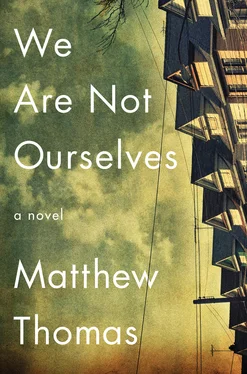Then his father faced the road again and they turned onto Columbia. They came to a derelict building with a long, faded sign that spelled KOHNSTAMMin capital letters. “This is what’s left of the factory I worked at,” his father said. Graffiti dotted its surface, and weather had worn off much of the paint, so that the ghostly outline of the words MANUFACTURING CHEMISTScould just barely be distinguished below the name. “There used to be so much manufacturing in this city. Now those jobs are gone. Factory work was a — how do I say it? It was an incubator for the middle class.”
His father was having one of those extended moments of lucidity in which he could hold forth about some topic and it wouldn’t seem like anything had happened to his mind. Connell always got a little charge of hope from them, a sense that some part of his father might be able to make it back from the other side of the creaky rope bridge.
“I wouldn’t have gotten where I did if it weren’t for a manufacturing job. We don’t make anything in this country anymore.”
“We make missiles,” Connell said. “Movies. Hamburgers.”
His father seemed not to have heard him. “I worked here at your age,” he said. Then he looked at him searchingly. “No, a little older than you. In my early twenties. I keep thinking you’re older than you are. You look so much like my brother Phil.”
Connell turned the radio on, found WDRE. The beginning notes of “Smells Like Teen Spirit” were playing and he turned it up. He didn’t even care if his father told him to turn it down, because in his mind he wasn’t really there. Maybe he wasn’t really there in his father’s mind either.
I need you to help me prepare for the tournament tomorrow.”
“Okay.”
“The resolution has to do with whether euthanasia is morally justified. I have to develop both a pro and a con argument. Do you know how this works?”
“I think so.”
“I’m going to come at you with pro. I want you to be con. Then we can switch it up. I’ll make my first affirmative. Then you do a cross-examination. We’ll go from there. I’ll talk you through it. Okay? Ready? My first contention is that euthanasia is justified because every human being has the supreme right of self-determination. We uphold an individual’s right to determine where he lives, where he works. If we consider those rights to be sacred, then there is no more fundamental right a person can hold than when he chooses to die. Patients should have the right to maintain control over their own situations. By allowing people to make their own decisions, we preserve free choice and human dignity. Dad, you’re supposed to be taking notes.”
“I’m listening.”
“You’re supposed to take notes, so you can come at my contention and try to take it down. Here. Write down what I say. You’re supposed to be scribbling fast. Come up with a counterargument. Try to find chinks in the armor of my argument. Challenge its underlying assumptions. You can argue that many people desirous of euthanasia who survive apparently terminal illnesses would wind up grateful they hadn’t been euthanized. Hit me hard, Dad. I need to practice evading without seeming to. It needs to look artless and artful at the same time. I need to stay calm and confident. Try to goad me into saying something stupid and mean. Last week I was a jerk, and even though I totally destroyed my opponent, the judge gave me a twenty-four — twenty-three, which messed up my seeding in the octofinals. Girls can be as aggressive as they want, which totally sucks. That Stuy girl couldn’t have been nastier, and she got a thirty — twenty-three. Then again, if I were a better debater, I could be really nice and get points for being so damned sweet. So that means practice, practice. I’m coming at you, Dad. Anyway, you can say, ‘It’s unfeasible. It’s impossible to put it into practice equitably.’ ”
“It’s unfeasible. It’s impossible to… what was that?”
“Never mind. Listen, conversations about efficacy are banned. So I say, ‘My opponent is making a policy argument that has no place in Lincoln-Douglas debate.’ Boo-yah! ”
“What? What happened?”
“I need to come up with some better hypotheticals. Something from Plato, Jefferson. Those fluency whores at Stuy aren’t going to eat my lunch over a goddamned metaphor.”
“What?”
“Nothing. Stuy is running Locke on aff. I want to be neg. I’m practically begging for neg. Let them play their strong hand. I’m taking that girl down this week. I can taste it. My second contention: the ‘social contract’ argument. The individual sacrifices certain rights and liberties to live under the protection of society. If an individual sacrifices the right to harm other people in exchange for the protections of living in society, euthanasia is justified because it is an act that has no harmful effects on others.”
“I don’t believe in euthanasia, son.”
“This is why you should affirm the resolution that euthanasia is morally just.”
“It’s not just, son. It’s not just or right at all.”
“Dad! I’m talking to the judges. I can’t look at you. Eye contact with the judges is crucial. You need to rebut me. Make a ‘slippery slope’ argument. If we allow euthanasia, it creates a slippery slope where suicide is justifiable. There would be rampant eugenics. Coerced euthanasia. It would have a disproportionate racial and economic impact. People might be pressured to euthanize others for positive gain or else to avoid an economic hardship.”
“Nobody is pressuring anyone to commit euthanasia. Not in this country.”
“Say that it’s not within the rights of the medical field to help patients die. Say that it’s their responsibility to help them improve or at least continue life, no matter its quality. Because if you say that, then I can argue that many terminally ill patients suffer a great deal of pain and no longer wish to have their lives artificially prolonged.”
“You lost me.”
“My third contention is that at times of extreme pain for the patient, euthanasia is the most humane alternative.”
“People get through pain.”
“Argue that new and improved pain-relieving medicines are being discovered all the time. That the timeline for such decisions must be extended to reflect the speed of technological change.”
“All I know is I don’t believe in euthanasia.”
“My opponent never responded to my third argument, so you should carry that through and affirm the resolution.”
“What argument? Son, can we stop this? Can we just talk?”
“You want to know what’s the best neg example you could have, Dad? You are. With your Alzheimer’s. Think about it. If we euthanized people at will, maybe you would have been taken out already. For the good of the herd.”
“Or maybe you would, son.”
“That Stuy girl is going to wish I had gotten taken out when I run into her in the finals this week.”
Early in the spring semester, Ed’s chair, Stan Kovey, called her at work to let her know that they’d had several complaints from Ed’s students, including, though he assured her it wasn’t credible, an anonymous death threat.
“A death threat ?”
“Not death,” Stan said mildly. “I shouldn’t have said death. Just injury.”
“Well, isn’t that a relief.”
“I’m not calling so much about the threat,” Stan said. “We’ve dealt with them before from disgruntled students. Some of these kids have learned not to trust institutions, due process, and the redress of injustices. What we need to discuss—”
Читать дальше
Конец ознакомительного отрывка
Купить книгу












